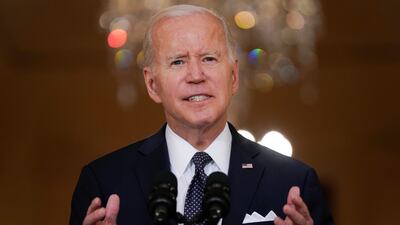After a marathon 15-hour session in Congress, US Democrats in the Senate on Sunday passed their $700 billion economic package designed to tackle climate change, inflation, pharmaceutical costs and corporate taxes.
US Vice President Kamala Harris cast the tie-breaking vote for a party-line ballot of 50-50.
The deliberations started on Saturday and went after sunrise through Sunday afternoon, as Democrats overcame a dozen Republican amendments designed to thwart the legislation.
Known as the Inflation Reduction Act of 2022, the package provides $370bn to tackle global warming by measures to reduce greenhouse gas emissions by 40 per cent by 2030.
The bill also aims to reduce prescription drug costs for the elderly and reduce inflation.
“I am confident the Inflation Reduction Act will be one of the defining feats of the 21st century,” Senate majority leader Chuck Schumer said before the vote.
"It will reduce inflation. It will lower prescription drug costs. It will fight climate change. It will close tax loopholes and it will reduce and reduce the deficit."
But non-partisan analysts have said the legislation would have a minor effect on surging consumer prices.
The bill is barely more than a tenth the size of US President Joe Biden's initial 10-year, $3.5 trillion package and abandons its proposals for universal preschool, paid family leave and expanded childcare aid.
Even so, the new measure gives Democrats a campaign-season showcase for action on key goals.
It includes the largest federal effort on climate change, hands Medicare the power to negotiate pharmaceutical prices for the first time, and extends expiring subsidies that help 13 million people to afford health insurance.
The legislation also aims to prevent large corporations from exploiting breaks to pay little if any tax,.
It is forecast to make the first substantial cut to budget deficits in more than 10 years.
Republicans, united in opposition, said it would not stop the historic levels of inflation and would impose taxes that could tip the US economy into recession.
The Senate vote was the culmination of a year and half of intra-party squabbling among Democrats about the scope of the bill, which Mr Biden had once hoped would be so sweeping as to rival Franklin D Roosevelt’s New Deal.
In the end it came down to two holdout moderate Democrats, Senators Joe Manchin and Kyrsten Sinema, whose votes were essential in the 50-50 Senate and who baulked at larger tax increases and more spending.
Mr Biden negotiated with Mr Manchin and Ms Sinema early on, but the deal that revived the bill was entirely negotiated on Capitol Hill.
The legislation now moves to the House, which is expected to vote on it on Friday.
The Associated Press and Bloomberg contributed to this report

